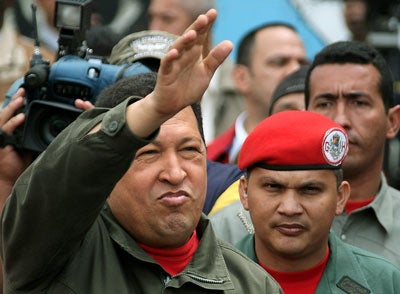Although numerous uncertainties surround Venezuelan President Hugo Chavez’s secretive battle with cancer and his ability to live until the October presidential elections, Chavez was sufficiently active to appear recently on television defending Syria’s sovereign right to massacre its citizens, mass graves and all, and to meet with a senior emissary of his close ally Alexander Lukashenko, long-standing dictator of Belarus
While Chavez defended Syria and praised friendly Belarus, his justice minister, Tareck El Aissami informed the press that the Venezuela military had recently bombed 36 clandestine air strips used for cocaine transit and said that Venezuela had reduced clandestine drug flights by 50 percent in 2012. Both claims remain to be verified independently.
These claims come in the wake of several indicators that Venezuela, instead of acting as a responsible actor in the fight against terrorism and international criminal organizations, has in fact been following a downward track toward rule by corruption, violence, and criminal mafias.
On May 22, the Revolutionary Armed Forces of Colombia (FARC) launched an attack from Venezuelan soil that killed 12 Colombian soldiers. Three days later, a Venezuela priest told a Colombian radio station that the head of FARC, Rodrigo Londono, and other members of FARC’s secretariat live on a farm owned by Chavez’s brother, Adan Chavez, reportedly a potential successor to Hugo.
In recent weeks, U.S. law enforcement has continued hearing evidence provided by ex-Venezuelan judge Eladio Aponte regarding alleged links between senior Chavez officials—including senior political figures like Diosdado Cabello, Defense Minister General Henry Rangel Silva, and anti-drug chief Colonel Nestor Reverol—and drug traffickers.
Chavez and company aspire to paint a picture of a regime battling crime, drug trafficking, and terrorism with a firm hand. The facts on the ground, however, fail to support the case.
And a Chavez electoral victory in October over rival Henrique Capriles will likely only worsen the situation and further open the door to Venezuela becoming what Moises Naim of the Carnegie Foundation has termed a “mafia state.”
